高中英语必修五第一单元教案
新课标高中英语必修5 Unit 1 教案
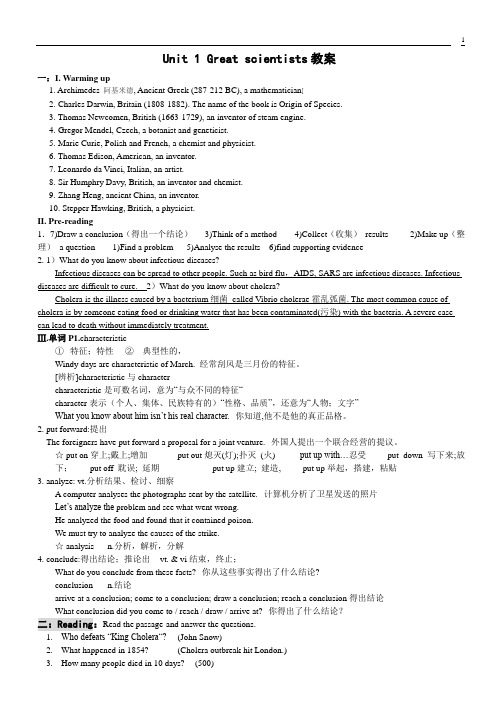
Unit 1 Great scientists教案一:I. Warming up1. Archimedes阿基米德, Ancient Greek (287-212 BC), a mathematician[2. Charles Darwin, Britain (1808-1882). The name of the book is Origin of Species.3. Thomas Newcomen, British (1663-1729), an inventor of steam engine.4. Gregor Mendel, Czech, a botanist and geneticist.5. Marie Curie, Polish and French, a chemist and physicist.6. Thomas Edison, American, an inventor.7. Leonardo da Vinci, Italian, an artist.8. Sir Humphry Davy, British, an inventor and chemist.9. Zhang Heng, ancient China, an inventor.10. Stepper Hawking, British, a physicist.II. Pre-reading1.7)Draw a conclusion(得出一个结论)3)Think of a method 4)Collect(收集)results 2)Make up(整理) a question 1)Find a problem 5)Analyse the results 6)find supporting evidence2. 1)What do you know about infectious diseases?Infectious diseases can be spread to other people. Such as bird flu,AIDS, SARS are infectious diseases. Infectious diseases are difficult to cure. 2)What do you know about cholera?Cholera is the illness caused by a bacterium细菌called Vibrio cholerae霍乱弧菌. The most common cause of cholera is by someone eating food or drinking water that has been contaminated(污染) with the bacteria. A severe case can lead to death without immediately treatment.Ⅲ.单词P1.characteristic①特征;特性②典型性的,Windy days are characteristic of March. 经常刮风是三月份的特征。
人教课标版高中英语必修5 Unit1_Grammar_名师教学设计(一)
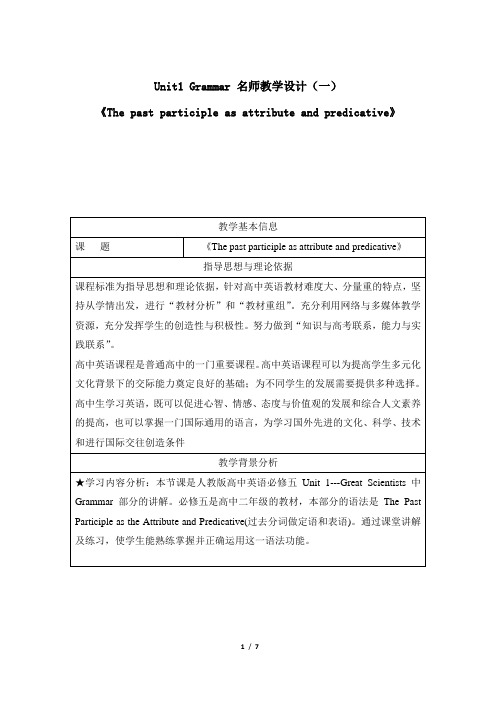
1、Communicativeteachingmethod;
2、Task-basedactivitiestogetthestudentstocomprehendtheusageofpastparticiple,
★情感态度与价值观:
1、Getthestuarlearning;
StepⅥHomework
Makeupastorybyusingpastparticiplesasattributeandpredicative
StepⅤGroupwork
AskthestudentstoworkingroupsanddescribetheirowntopicsbyimitatingmydescriptionofDengChao,Theyarerequiredtousepastparticipleasattributeandpredicative,Lateramembercomestothefronttoreadtheirdescriptionandtheotherstudentsguess,
教学背景分析
★学习内容分析:本节课是人教版高中英语必修五Unit1---GreatScientists中Grammar部分的讲解。必修五是高中二年级的教材,本部分的语法是ThePastParticipleastheAttributeandPredicative(过去分词做定语和表语)。通过课堂讲解及练习,使学生能熟练掌握并正确运用这一语法功能。
Pickoutallthepastparticiplesinthesummaryandguidethestudentstodrawthefollowingconclusion,
Conclusion:
过去分词真容易,动词后面加ed,
人教版英语必修五 Unit 1 全单元教案
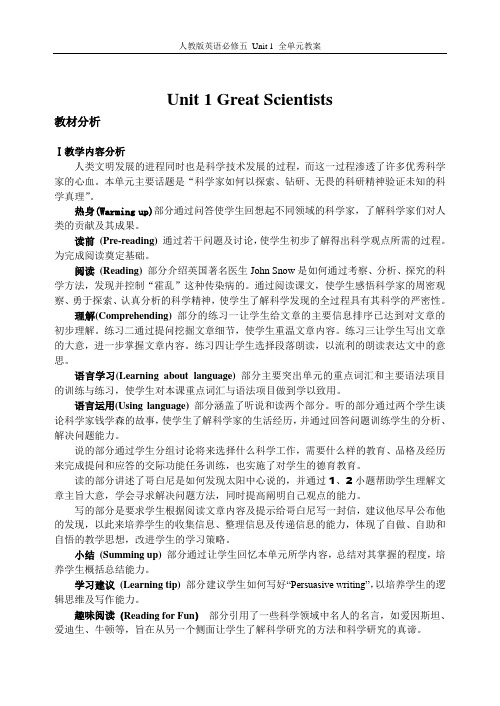
Unit 1 Great Scientists教材分析Ⅰ教学内容分析人类文明发展的进程同时也是科学技术发展的过程,而这一过程渗透了许多优秀科学家的心血。
本单元主要话题是“科学家如何以探索、钻研、无畏的科研精神验证未知的科学真理”。
热身(Warming up)部分通过问答使学生回想起不同领域的科学家,了解科学家们对人类的贡献及其成果。
读前(Pre-reading) 通过若干问题及讨论,使学生初步了解得出科学观点所需的过程。
为完成阅读奠定基础。
阅读(Reading) 部分介绍英国著名医生John Snow是如何通过考察、分析、探究的科学方法,发现并控制“霍乱”这种传染病的。
通过阅读课文,使学生感悟科学家的周密观察、勇于探索、认真分析的科学精神,使学生了解科学发现的全过程具有其科学的严密性。
理解(Comprehending) 部分的练习一让学生给文章的主要信息排序已达到对文章的初步理解。
练习二通过提问挖掘文章细节,使学生重温文章内容。
练习三让学生写出文章的大意,进一步掌握文章内容。
练习四让学生选择段落朗读,以流利的朗读表达文中的意思。
语言学习(Learning about language) 部分主要突出单元的重点词汇和主要语法项目的训练与练习,使学生对本课重点词汇与语法项目做到学以致用。
语言运用(Using language) 部分涵盖了听说和读两个部分。
听的部分通过两个学生谈论科学家钱学森的故事,使学生了解科学家的生活经历,并通过回答问题训练学生的分析、解决问题能力。
说的部分通过学生分组讨论将来选择什么科学工作,需要什么样的教育、品格及经历来完成提问和应答的交际功能任务训练,也实施了对学生的德育教育。
读的部分讲述了哥白尼是如何发现太阳中心说的,并通过1、2小题帮助学生理解文章主旨大意,学会寻求解决问题方法,同时提高阐明自己观点的能力。
写的部分是要求学生根据阅读文章内容及提示给哥白尼写一封信,建议他尽早公布他的发现,以此来培养学生的收集信息、整理信息及传递信息的能力,体现了自做、自助和自悟的教学思想,改进学生的学习策略。
高中英语必修五Unit1教案
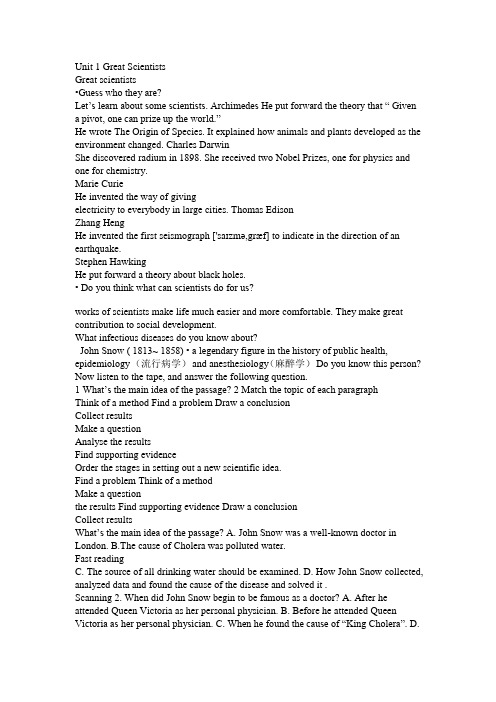
Unit 1 Great ScientistsGreat scientists•Guess who they are?Let’s learn about some scientists. Archimedes He put forward the theory that “ Given a pivot, one can prize up the world.”He wrote The Origin of Species. It explained how animals and plants developed as the environment changed. Charles DarwinShe discovered radium in 1898. She received two Nobel Prizes, one for physics and one for chemistry.Marie CurieHe invented the way of givingelectricity to everybody in large cities. Thomas EdisonZhang HengHe invented the first seismograph ['saɪzmə,græf] to indicate in the direction of an earthquake.Stephen HawkingHe put forward a theory about black holes.• Do you think what can scientists do for us?works of scientists make life much easier and more comfortable. They make great contribution to social development.What infectious diseases do you know about?John Snow ( 1813~ 1858) • a legendary figure in the history of public health, epidemiology (流行病学)and anesthesiology(麻醉学)Do you know this person? Now listen to the tape, and answer the following question.1 What’s the main idea of the passage?2 Match the topic of each paragraphThink of a method Find a problem Draw a conclusionCollect resultsMake a questionAnalyse the resultsFind supporting evidenceOrder the stages in setting out a new scientific idea.Find a problem Think of a methodMake a questionthe results Find supporting evidence Draw a conclusionCollect resultsWhat’s the main idea of the passage? A. John Snow was a well-known doctor in London. B.The cause of Cholera was polluted water.Fast readingC. The source of all drinking water should be examined.D. How John Snow collected, analyzed data and found the cause of the disease and solved it .Scanning 2. When did John Snow begin to be famous as a doctor? A. After he attended Queen Victoria as her personal physician. B. Before he attended Queen Victoria as her personal physician. C. When he found the cause of “King Cholera”. D.After he defeated “King Cholera”.Scanning3. Some people thought that cholera spread _____ before John Snow found its cause.A. in the airB. by the beerC. in the waterD. by the birdsScanning4. What played an important role in John Snow’s discovery?A. The woman moving away from Broad Street.B. The government.C. The map made by himself.D. Queen Victoria’s help.Scanning 5. At last, “King Cholera” was brought under control by ____.A. using medicines in hospitalsB. driving patients out of the countryC. dealing with the polluted waterD. getting rid of all kinds of pollution6. Which of the following is TRUE?A. John Snow became famous after cholera hit England in the 19th century. B. John Snow began to collect information long before cholera hit England in the 19th century. C. The mother and her daughter mentioned in the text both lived in Broad Street. D. D John。
必修五Unit1教案设计
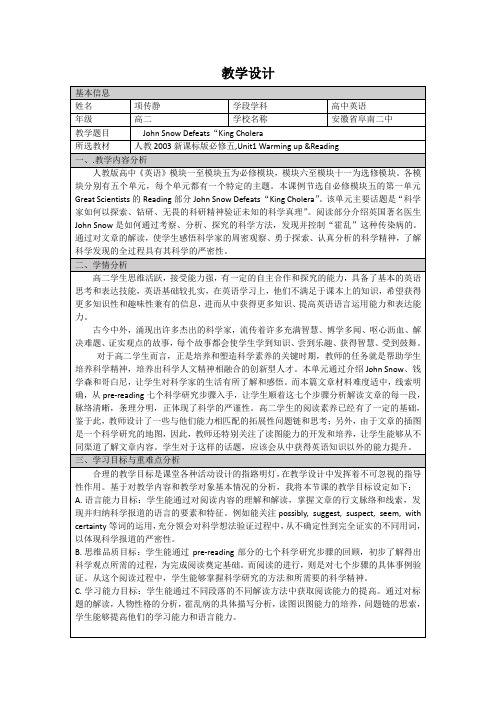
教学设计
Scan Para.5
What happened to the pump water?
Scan Para.6
What extra evidence did he find?
Scan Para.7
1. What did he suggest in order to prevent it from happening?
2. What happened finall y? 多,而有了小组的共同参与,个体的阅读压力能减小很多,而且也能让所有小组成员共同参与共同探讨,这本身就是
现;另外,读图能力也是科学能力当中非常重要的一种,因此,在这个过程中,笔者大胆采用了此方法,旨在提高学生的参与感和读图能力。
中文的句子和图片中的绘制相统一,让学生在寻找细节的同时也寻找原因所在,环环相扣,最后结论的给出也显得更加自然和流畅。
七、板书设计。
人教版高中英语必修5《Unit1Greatscientists》教案

人教版高中英语必修5《Unit1Greatscientists》教案人教版高中英语必修5《Unit 1 Great scientists》教案【一】教学准备教学目标1.Students learn some new words and expressions to describe people ,especially famous persons;2.Students are encouraged to give more information about famous persons who they are familiar:3. Students can realize that it is scientific spirit that makes those scientists successful.教学重难点1. Words and expressions in this unit2. Previous knowledge of some of the famous scientists3. Comprehending the text教学过程【导入】Words learning(Students are assigned to learn the new words of this unit and find out the English explainations of the new words ) Definitions or explanationsA.examine 1.general principles of an art or scienceB.repeat 2.say or do againC.theory 3.at once; without delayD.immediate 4.look at...carefully in order to learn about or from...plete 5.of great value, worth or useF.valuable 6.having all its parts; whole; finishedG.announce 7.make knownH.control e or bring to an endI.positive 9.power to order or directJ.conclude 10.quite certain or sure【讲授】useful sentences learning(The sentences are picked from the text.)1.“All roads lead to Rome, ”he encouraged me after I failed the entrance examination.2.This sentence doesn’t make any sense.3.Our English teacher is not only strict with us but also friendly to us.4.He is good-looking, apart from his nose.5.It is announced that the spacecraft, Shenzhou Ⅵ, landed on the earth successfully.6.It is not Tom but you who are to blame.7.In 1995, the Chinese government put forward a plan for“rejuvenating the nation by relying on science and education”.And it has helped Chinese scientists make many breakthroughs.8.Have you drawn any conclusion after you read this passage?9.Well done.So much for the learning of the new words and expressions.【讲授】Introduction of a classic articleTeacher introduce a famous person --Qian Xuesen and students learn to write an article about the famous scientis using the words and expressions they just learn in class.【活动】Share the outcomeStudents share their article orally and discuss whether they have used some good and advanced expressions.【练习】Consolidation完成句子(1)爱因斯坦被认为是二十世纪最伟大的科学家之一。
必修五unit1教案
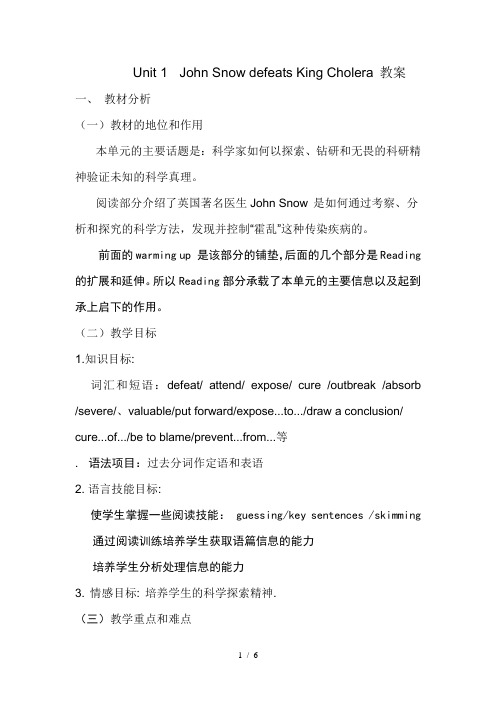
Unit 1 John Snow defeats King Cholera 教案一、教材分析(一)教材的地位和作用本单元的主要话题是:科学家如何以探索、钻研和无畏的科研精神验证未知的科学真理。
阅读部分介绍了英国著名医生John Snow 是如何通过考察、分析和探究的科学方法,发现并控制“霍乱”这种传染疾病的。
前面的warming up 是该部分的铺垫,后面的几个部分是Reading 的扩展和延伸。
所以Reading部分承载了本单元的主要信息以及起到承上启下的作用。
(二)教学目标1.知识目标:词汇和短语:defeat/ attend/ expose/ cure /outbreak /absorb /severe/、valuable/put forward/expose...to.../draw a conclusion/ cure...of.../be to blame/prevent...from...等. 语法项目:过去分词作定语和表语2. 语言技能目标:使学生掌握一些阅读技能: guessing/key sentences /skimming 通过阅读训练培养学生获取语篇信息的能力培养学生分析处理信息的能力3. 情感目标: 培养学生的科学探索精神.(三)教学重点和难点重点:通过阅读,掌握词汇、句型,提高学生的阅读水平。
难点:通过阅读,进行分析归纳;过去分词作定语和表语。
二、学情分析高二学生经过高中一年的语言学习,已经初步掌握了阅读文章的方法,有一定的分析、概括能力。
他们的英语基础知识和基本技能处在一个逐步上升的阶段。
因此,我将引导学生自主参与学习、交流合作,使学生在自主与合作的学习方式中获取知识,形成正确的学习方法。
实现阅读能力的提高。
三、Teaching method 教学方法根据本单元的主题及内容,为了突出重点,达到预定的教学目标,我将采用:cooperative Learning approach合作学习教学法.task-based teaching and learning approach任务型语言教学法 communicative Approach交际教学法discussion/practicing/summarizing 等。
必修五unit1教案

必修五unit1教案教案标题:必修五 Unit 1 教案教学目标:1. 了解并理解本单元的主题和话题;2. 学习并掌握本单元的核心词汇和短语;3. 提高学生的听说读写能力;4. 培养学生的合作与交流能力。
教学重点:1. 掌握本单元的核心词汇和短语;2. 提高学生的听说读写能力。
教学难点:1. 运用所学知识和词汇进行口头和书面表达;2. 培养学生的合作与交流能力。
教学准备:1. 教材:必修五课本 Unit 1;2. 多媒体设备;3. 单词卡片、图片等教具。
教学过程:Step 1:导入(5分钟)1. 利用图片或实物引起学生对本单元主题的兴趣,激发学生的学习欲望;2. 导入本单元的主题和话题,引发学生对话题的思考和讨论。
Step 2:词汇学习(15分钟)1. 呈现并教授本单元的核心词汇和短语,使用各种教具和多媒体设备帮助学生理解和记忆;2. 组织学生进行词汇拓展活动,巩固新学词汇的掌握。
Step 3:听力训练(20分钟)1. 播放录音,让学生进行听力练习,理解对话和文章的主要内容;2. 组织学生进行听力理解的练习,如听后回答问题、听后填空等。
Step 4:口语训练(20分钟)1. 进行口语训练,组织学生进行对话练习,让学生在真实情景中运用所学知识进行口头表达;2. 利用小组活动或角色扮演,提高学生的口语表达能力和合作交流能力。
Step 5:阅读训练(15分钟)1. 学生阅读课文,理解文章的主要内容和细节信息;2. 组织学生进行阅读理解练习,如回答问题、填空等。
Step 6:写作训练(20分钟)1. 引导学生根据所学知识和词汇,进行写作训练,如写一篇关于旅行的短文、写一封邀请信等;2. 指导学生在写作过程中注意语法、词汇和句子结构的正确使用。
Step 7:复习与总结(10分钟)1. 复习本节课所学内容,巩固学生的知识掌握;2. 总结本节课的学习收获,鼓励学生积极参与课堂活动。
Step 8:作业布置(5分钟)布置相关的课后作业,如完成课本练习、写一篇关于旅行的短文、准备下节课的听力材料等。
人教版高中英语必修5 Unit1_Grammar_优教教学设计(一)
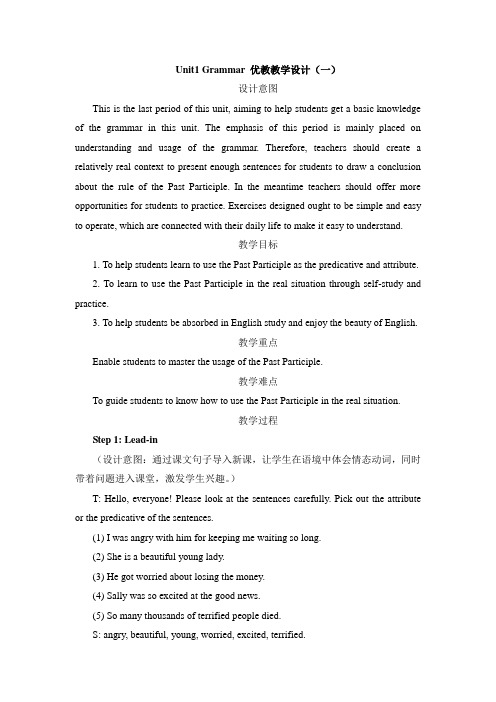
Unit1 Grammar 优教教学设计(一)设计意图This is the last period of this unit, aiming to help students get a basic knowledge of the grammar in this unit. The emphasis of this period is mainly placed on understanding and usage of the grammar. Therefore, teachers should create a relatively real context to present enough sentences for students to draw a conclusion about the rule of the Past Participle. In the meantime teachers should offer more opportunities for students to practice. Exercises designed ought to be simple and easy to operate, which are connected with their daily life to make it easy to understand.教学目标1. To help students learn to use the Past Participle as the predicative and attribute.2. To learn to use the Past Participle in the real situation through self-study and practice.3. To help students be absorbed in English study and enjoy the beauty of English.教学重点Enable students to master the usage of the Past Participle.教学难点To guide students to know how to use the Past Participle in the real situation.教学过程Step 1: Lead-in(设计意图:通过课文句子导入新课,让学生在语境中体会情态动词,同时带着问题进入课堂,激发学生兴趣。
必修五 Unit1教案
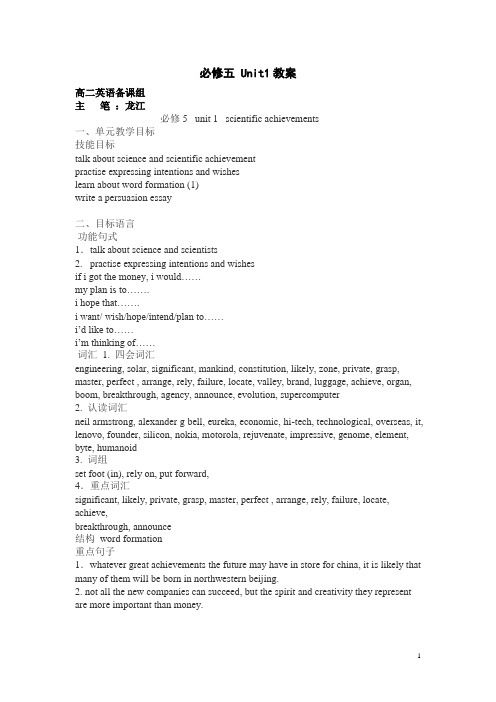
必修五 Unit1教案高二英语备课组主笔:龙江必修5 unit 1 scientific achievements一、单元教学目标技能目标talk about science and scientific achievementpractise expressing intentions and wisheslearn about word formation (1)write a persuasion essay二、目标语言功能句式1.talk about science and scientists2. practise expressing intentions and wishesif i got the money, i would……my plan is to…….i hope that…….i want/ wish/hope/intend/plan to……i’d like to……i’m thinking of……词汇1. 四会词汇engineering, solar, significant, mankind, constitution, likely, zone, private, grasp, master, perfect , arrange, rely, failure, locate, valley, brand, luggage, achieve, organ, boom, breakthrough, agency, announce, evolution, supercomputer2. 认读词汇neil armstrong, alexander g bell, eureka, economic, hi-tech, technological, overseas, it, lenovo, founder, silicon, nokia, motorola, rejuvenate, impressive, genome, element, byte, humanoid3. 词组set foot (in), rely on, put forward,4.重点词汇significant, likely, private, grasp, master, perfect , arrange, rely, failure, locate, achieve,breakthrough, announce结构word formation重点句子1.whatever great achievements the future may have in store for china, it is likely that many of them will be born in northwestern beijing.2. not all the new companies can succeed, but the spirit and creativity they represent are more important than money.三、教材分析与教材重组1. 教材分析通过学习了解人类的科学成就,帮助学生认识到这些成就深刻地改变了人类生产和生活的方式及质量,同时也深刻地改变了人类的思维观念和对世界的认识,改变并继续改变着世界的面貌,极大地推动了社会的发展。
人教版英语必修五 Unit 1 教案
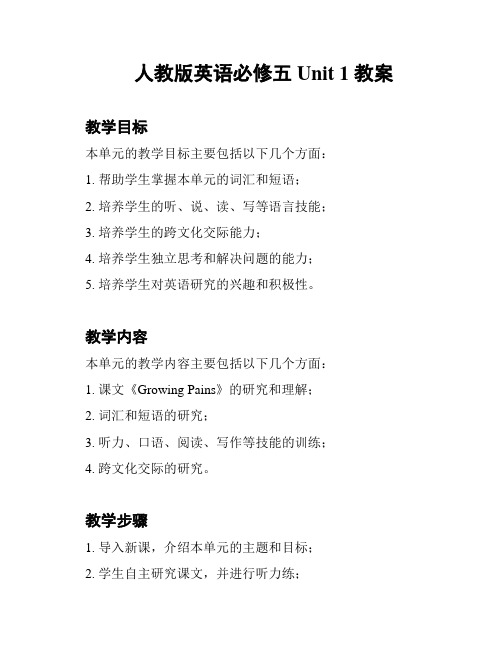
人教版英语必修五 Unit 1 教案教学目标本单元的教学目标主要包括以下几个方面:1. 帮助学生掌握本单元的词汇和短语;2. 培养学生的听、说、读、写等语言技能;3. 培养学生的跨文化交际能力;4. 培养学生独立思考和解决问题的能力;5. 培养学生对英语研究的兴趣和积极性。
教学内容本单元的教学内容主要包括以下几个方面:1. 课文《Growing Pains》的研究和理解;2. 词汇和短语的研究;3. 听力、口语、阅读、写作等技能的训练;4. 跨文化交际的研究。
教学步骤1. 导入新课,介绍本单元的主题和目标;2. 学生自主研究课文,并进行听力练;3. 进行课文的理解和讨论,引导学生思考和表达观点;4. 研究和掌握本单元的词汇和短语;5. 进行听说训练,提高学生的口语表达能力;6. 进行阅读和写作训练,培养学生的阅读理解和写作技能;7. 进行跨文化交际的研究,增进学生对英语和其他文化的认识。
教学评价本单元的教学评价主要以以下方式进行:1. 各种形式的课堂练和作业,检测学生对知识的掌握程度;2. 口语和写作表现的评价,评估学生语言运用的能力;3. 学生参与课堂讨论和发言的情况,评估学生的思维能力和表达能力。
教学资源本单元的教学资源包括以下几个方面:1. 课本《人教版英语必修五》;2. 音频材料;3. 多媒体设备;4. 教学课件和作业练册。
以上为《人教版英语必修五 Unit 1 教案》的简要内容,旨在帮助教师设计和安排本单元的教学活动。
具体的教学步骤和细节应根据实际情况进行调整和完善。
高中英语必修五第一单元教案
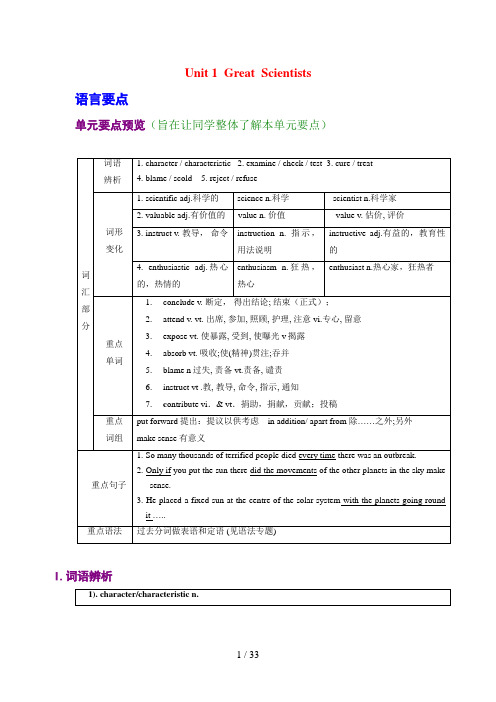
Unit 1 Great Scientists 语言要点单元要点预览(旨在让同学整体了解本单元要点)I.词语辨析II. 词形变化Ⅲ.重点词汇1. conclude vi.终结;结束; 推断;决定[典例]1)The meeting concluded at ten o'clock. 会议于十点钟结束。
2)It is hard to conclude. 这很难断定。
[重点用法]conclusion n. 结束,结论make/draw/reach/come to/arrive at a conclusion下结论,得出结论;bring sth. to a conclusion使…结束;in conclusion作为结论,最后;[练习] 汉译英1)我们推定蓝队无法按时抵达目的地。
_______________________________________________________________________________ ___________2)我们认定他并没有告诉我们实情,也就是他在撒谎。
_______________________________________________________________________________ ___________Keys:1) We concluded that the blue team could not reach the destination on time. 2) We concluded that he didn’t tell us the truth. That is, he was lying.2. attend v. 1)注意;留意;处理(与to连用)=do with2) 出席;到场: 3)照看;照料:=take care; look after[典例]1)We'll attend to the problem later.稍后我们将关注那个问题。
高中英语必修5教案-Unit1

高中英语必修5教案-Unit1人教版高中英语必修5教案Unit 1 Great scientistsPeriod 1 Warming up and readingLearning aims:1. To help students learn to describe people2. To help students learn to read a narration about John Snow3. To help students better understand “Great scientists”Important Points:T o help students learn to read a narration about John Snow Difficult Points:T o help students learn to describe peopleTeaching Procedures:Ⅰ. Warming upStep I Lead inTalk about scientist.T: Hi, morning, class. Nice to see you on this special day, the day when you become a senior two grader. I am happy to be with you helping you with your English. Today we are to read about a certain scientist. But first le t’s define the word “scientist”. What is a scientist?A scientist is a person who works in science, trying to understand how the universe or other things work.Scientists can work in different areas of science. Here are some examples: Those that study physics are physicists. Those that study chemistry are chemists. Those that study biology are biologists.Step II BrainstormingAsk the students to try the quiz and find out who knows the most.T: There are some great scientific achievements that have changed the world. Can you name some of them? What kind of role do they play in the field of science? Do these achievements have anything in common? Match the inventions with their inventors.II. Pre-readingGet the students to discuss the questions on page 1 with their partners. Then ask the students to report their work. Encourage the students to express their different opinions.1.What do you know about infectious diseases?2.What do you know about cholera?3. Do you know how to prove a new idea in scientific research?III. ReadingStep I Pre-reading1.Do you know John Snow?2.Do you know what kind of disease is cholera?Let’s get to know how Dr. John Snow defeated “King Cholera” in 1854 in London in this reading passage:Step II SkimmingRead the passage and answer the questions.1.Who defeats “King Cholera“? (John Snow)2.What happened in 1854? (Cholera outbreak hit London.)3.How many people died in 10 days? (500)4.Why is there no death at No. 20 and 21 Broad Street as well as at No. 8 and 9Cambridge Street?(These families had not drunk the water from the Broad Street pump.)(Optional)Skim the passage and find the information to complete theform below.Who WhenWhat How ResultJohn Snow 1854 helpingordinarypeopleexposed tocholeraExamining the sourceof all water suppliesand finding newmethods of dealingwith polluted waster“King Cholera”defeatedStep III ScanningRead the passage and number these events in the order that they happened.2 John Snow began to test two theories.1 An outbreak of cholera hit London in 1854.4 John Snow marked the deaths on a map.7 He announced that the water carried the disease.3 John Snow investigated two streets where the outbreak was very severe.8 King Cholera was defeated.5 He found that most of the deaths were near a water pump.6 He had the handle removed from the water pump.Step IV Main idea and correct stageRead the passage and put the correct stages into the readingabout research into a disease.John Snow Defeats “King Cholera”ParagraphStages General ideas1 Find a problem:What cause the cholera?The causes of cholera2 Make up a question:Which is right?The correct or possible theory3 Think of a method:Test two theoryCollect data on where people were ill anddied and where they got their water4 Collect results:Mark the deathPlot information on a map to find outwhere people died or did not die5 Analyze the results:Find the resource of thewaterLook into the water to see if that is thecause of the illness6 Find supporting evidence Find other evidences to confirm hisconclusion7 Draw a conclusion The polluted dirty source of drinkingwater was to blame for the cause of theLondon choleraStep V Group discussionAnswer the questions (Finish exercise 2 on Page 3)1. John Snow believed Idea 2 was right. How did he finally prove it?(John Snow finally proved his idea because he found an outbreak that was clearly related to cholera, collected information and was able to tie cases outside the area to the polluted water.)2. Do you think John Snow would have solved this problem without the map?(No. The map helped John Snow organize his ideas. He was able to identify those households that had had many deaths and check their water-drinking habits. He identified those houses that had had no deaths and surveyed their drinking habits. The evidence clearly pointed to the polluted water being the cause.)3. Cholera is a 19th century disease. What disease do you think is similar to cholera today?(Two diseases, which are similar today, are SARS and AIDS because they are both serious, have an unknown cause and need public health care to solve them.) Step VI SummaryUsing the stages for scientific research and write a summary.Period 2&3 Language focusLearning aims: To help students learn to use some important words and expressions Important Points:To help students learn to remember some important words and expressions Difficult Points: To help students learn to use some important words and expressions Teaching Procedures:Step I Warming up1.characteristic①n. a quality or feature of sth. or someone that is typical ofthem and easy torecongnize.特征;特性What characteristics distinguish the Americans from the Canadians.② a. very typical of a particular thing or of someone’s characer 典型性的,Such bluntness is characteristic of him.Windy days are characteristic of March.[辨析]characteristic与charactercharacteristic是可数名词,意为“与众不同的特征“character表示(个人、集体、民族特有的)“性格、品质”,还意为“人物;文字”What you know about him isn’t his real character.2. put forward: to state an idea or opinion, or to suggest a plan or person, for other people to consider提出He put forward a new theory.The foreigners have put forward a proposal for a joint venture.An interesting suggestion for measuring the atmosphere around Mars has been put forward.☆ put on穿上;戴上;增加put out熄灭(灯);扑灭(火) put up with…忍受put down写下来;放下; put off 耽误; 延期put up建立; 建造, put up举起,搭建,粘贴3. analyze: to examine or think about something carefully in order to understand it vt.分析结果、检讨、细察A computer analyses the photographs sent by the satellite.The earthquake expert tried to analyze the cause of the earthquake occurred on May 12,2008.Let’s analyze the problem and see what went wrong.He analyzed the food and found that it contained poison.We must try to analyze the causes of the strike.☆ analy sis n.分析,解析,分解4. conclude: decide that sth. is true after considering al the information you have 得出结论;推论出to end sth. such as a meeting or speech by doing or saying one final thing vt. & vi结束,终止;We concluded the meeting at 8 o’clock with a pr ayer.From his appearance we may safely conclude that he is a heavy smoker.What do you conclude from these facts?We conclude to go out / that we would go out.conclusion n.结论arrive at a conclusion; come to a conclusion; draw a conclusion; reach a conclusionWhat conclusion did you come to / reach / draw / arrive at?From these facts we can draw some conclusions about how the pyramids were built.Step 2 Reading1. defeat① vt. to win a victory over someone in a war, competition, game etc.打败,战胜,使受挫I’ve tried to solv e the problem, but it defeats me!Our team defeated theirs in the game.② n.失败,输failure to win or succeedThis means admitting defeat.They have got six victories and two defeats.[辨析]win, beat与defeat①win “赢得”赛事、战事、某物;后接人时,意为“争取赢得…的好感或支持;说服”②beat “战胜”“击败”比赛中的对手,可与defeat互换We beat / defeated their team by 10 scores.They won the battle but lost many men.The local ball team won the state championship by beating / defeating all the other teams.I can easily beat /defeat him at golf.He is training hard to win the race and realize his dream of becoming a champion at the 2008 Olympic Games.2. expert① n. someone who has a special skill or special knowledge of a subject专家,能手an expert in psychology an agricultural expert② a. having special skill or special knowledge of a subject熟练的,有专门技术的an expert rider an expert job需专门知识的工作He is expert in / at cooking.3. attend vt. &vi 参加,注意,照料① be present at参加attend a ceremony / lecture / a movie / school / class / a meetingI shall be attending the meeting.Please let me know if you are unable to attend the conference.② attend to (on): to look after, care for, serve伺候, 照顾,看护The queen had a good doctor attending on her.Dr Smith attended her in hospital. 治疗Are you being attended to?接待Mother had to attend to her sick son.③ attend to处理,注意倾听attend to the matterA nurse attends to his needs.Can you attend to the matter immediately?I may be late – I have got one or two things to attend to.Excuse me, but I have an urgent matter to attend to.[辨析]attend, join, join in与take part in①attend指参加会议、上课、上学、听报告等②join 指加入某组织、团体,成为其中一员③join in指加入某种活动;表示与某人一起做某事join sb. in sth.④take part in指参加正式的、有组织的活动,切在活动中起积极作用Only 2 people attended the meeting.He joined the Communist Youth League in 2007.Will you join us in the game?We often tale part in the after-class activities.4. expose : to show sth. that is usually covered暴露expose sth. to the light of day 把某事暴露于光天化日之下I threatened to expose him ( to the police). 我威胁要(向警察)揭发他.He exposed his skin to the sun.他把皮肤暴露在阳光下.The old man was left exposed to wind and rain.When he smiled he exposed a set of perfect white teeth.5. cure vt. & n. to make someone who is ill well agian治疗,痊愈When I left the hospital I was completely cured.①cure sb of a diseaseWhen you have a pain in your shoulders, you will go to see a doctor. The doctor will cure you.The only way to cure backache is to rest.He will cure the pain in your shouldersWhen I left the hospital I was completely cured.The illness cannot be cured easily.Although the boy was beyond cure, his parents tried to cure him of bad habits.②a cure for a diseaseAspirin is said to be a wonderful cure for the pain.There is still no cure for the common cold.Is there a certain cure for cancer yet?③a cure for sth.: to remove a problem, or improve a bad situation解决问题,改善困境The prices are going up every day, but there is no cure for rising prices.[辨析]cure与treat①cure主要指痊愈,强调的是结果②treat强调治疗过程,指通过药物、特别的食品或运动治疗病人或疾病,不强调结果。
高中英语人教必修五unit1GreatScientists全单元优质教案
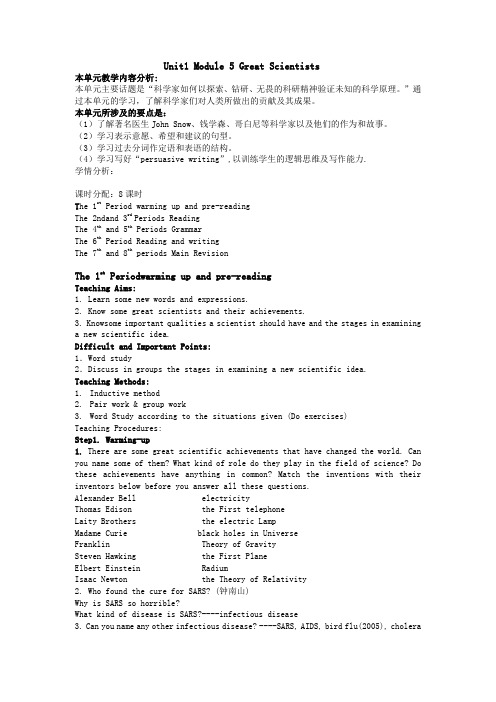
Unit1 Module 5 Great Scientists本单元教学内容分析:本单元主要话题是“科学家如何以探索、钻研、无畏的科研精神验证未知的科学原理。
”通过本单元的学习,了解科学家们对人类所做出的贡献及其成果。
本单元所涉及的要点是:(1)了解著名医生John Snow、钱学森、哥白尼等科学家以及他们的作为和故事。
(2)学习表示意愿、希望和建议的句型。
(3)学习过去分词作定语和表语的结构。
(4)学习写好“persuasive writing”,以训练学生的逻辑思维及写作能力.学情分析:课时分配:8课时T he 1st Period warming up and pre-readingThe 2ndand 3rd Periods ReadingThe 4th and 5th Periods GrammarThe 6th Period Reading and writingThe 7th and 8th periods Main RevisionThe 1st Periodwarming up and pre-readingTeaching Aims:1. Learn some new words and expressions.2. Know some great scientists and their achievements.3. Knowsome important qualities a scientist should have and the stages in examininga new scientific idea.Difficult and Important Points:1.Word study2.Discuss in groups the stages in examining a new scientific idea.Teaching Methods:1.Inductive method2.Pair work & group work3.Word Study according to the situations given (Do exercises)Teaching Procedures:Step1. Warming-up1. There are some great scientific achievements that have changed the world. Can you name some of them? What kind of role do they play in the field of science? Do these achievements have anything in common? Match the inventions with their inventors below before you answer all these questions.Alexander Bell electricityThomas Edison the First telephoneLaity Brothers the electric LampMadame Curie black holes in UniverseFranklin Theory of GravitySteven Hawking the First PlaneElbert Einstein RadiumIsaac Newton the Theory of Relativity2. Who found the cure for SARS? (钟南山)Why is SARS so horrible?What kind of disease is SARS?----infectious disease3. Can you name any other infectious disease? ----SARS, AIDS, bird flu(2005), choleraH1N1,HFMD(手足口病)Step2. Pre-reading1. Cholera may be rare nowadays except in some poor areas, but back in the 1830s-1840s, it was probably No.1 killer in the world. There were four outbreaks of cholera in the 1830s and 1840s, which killed many thousands of people in the industrial cities of England. In 1854 on August 31st “the most terrible outbreak of cholera which ever occurred in the kingdom” began. It was so violent and sudden that 127 people around Broad Street died in the first three days. And then a famous physician John Snow discovered the source of the disease and since then Cholera was finally brought under control.2. How did he solve the problem of cholera? Actually, he followed a scientific procedure to carry out his scientific research. The whole procedure is made up of 7 steps. Can you put them in a right order?Draw a conclusion Think of a method Collect results Make up a question Find a problem Analyze the results Repeat if necessaryStep 3 SummaryStep 4 Homework Assignment1.Read the passage John Snow Defeats “King Cholera”.2. Learn the new words by heart and prepare for tomorrow’s dictation.课后反思:The 2ndand 3rd Periods ReadingTeaching aims:1. Learn some new words and expressions.2. Improve the students’ reading skills.3. Know how to prove a new idea in scientific research.Difficult and Important Points:(1)Reading comprehension(2)What did John Snow do to prove a new idea in scientific research?Teaching Methods:1. Group work2. Competition3. Illustration4. Deductive MethodTeaching Procedures:Step 1Lead inBackground introduction to John SnowJohn Snow (1813-1858) was born and worked as a doctor in Great Britain. He was originally an anesthetist(麻醉师).He was so famous that he became the doctor for Queen Victoria at the births of her many children.Four outbreaks of cholera in the 1830s and 1840s killed many people in England. In 1854, “the most terrible outbreak of cholera which ever occurred in the kingdom” began. It was so violent and sudden that 127people died in the first three days. Step 2 Skimming and ScanningMore questions are given to get the general ideas of this passage and some obvious facts.Who defeats “King Cholera“? John SnowWhat happened in 1854? Cholera outbreak hit London.How many people died in 10 days? 500Why is there no death at No. 20 and 21 Broad Street as well as at No. 8 and 9 Cambridge Street?These families had not drunk the water from the Broad Street pump.Step 3 Reading for details1. Why couldn’t the cholera be under control at first?Neither its cause, not its cure was understood.2. Which theory did John Snow believe in?People absorbed cholera into their bodies with their meals.3. John Snow finally proved the theory he believed by ________.gathering information with the help of a maplooking into the source of the water for Broad Street and Cambridge Street Separating those who suffered cholera from those who didn’tBoth A and B (right choice)4. To prevent the cholera from spreading again, what did John Snow do? Suggested that the source of all water supplies be examine. Suggested that new methods of dealing with polluted water be found. Instructed the water companies not to expose people to the polluted water anymore.Step 4 Summing up: Read the passage silently and quickly and match the stages ofThe same with above:Find a problem draw a conclusion Think of a method Collect results Make up a question Analyze the results Repeat if necessaryParagraph 1: Introduction of John Snow and CholeraParagraph 2: Two theoryParagraph 3-5: Study of the breakout in 1854Paragraph 3: Think of a method: Test two theoryCollect the result: Mark the deathAnalyze the result: Reason for death and no deathParagraph 4: Analyze the result: Find the resource of the waterParagraph 5: Repeat if necessary: Find more evidence.Draw a conclusion: Cholera was spread by germPolluted water carried cholera Paragraph 6: Prevention of CholeraStep 5 Retell the passage (文章缩写仅供参考)Provide ss with a summary with some blanks. Let them retell the passage as well as pay attention to some important words.Read the passage again and fill in the blanks:John Snow was a well-known ____ in London in the ___ century. He wanted to find the ______ of cholera in order to ______ it. In 1854 when a cholera ____ out, he began to gather information. He _____ on a map where all the dead people had lived and he found that many people who had drunk the dirty water from the ______ died. Sohe decided that the polluted water carried cholera. He suggested that the _____ of all water supply be _______ and new methods of ________ with polluted water be found. Finally, “King Cholera” was defeated.Key: (见课文和教师用书)Step 6Language learning1.So many thousands of terrified people died every time there was an outbreak. 每当(疾病)突发时,总有成千的人死去【句型剖析】 1)本句是一个复合句,every time引导的是一个时间状语从句,意思是“每当……”,相当于“when”。
高中英语 Unit 1 整体教案必修五
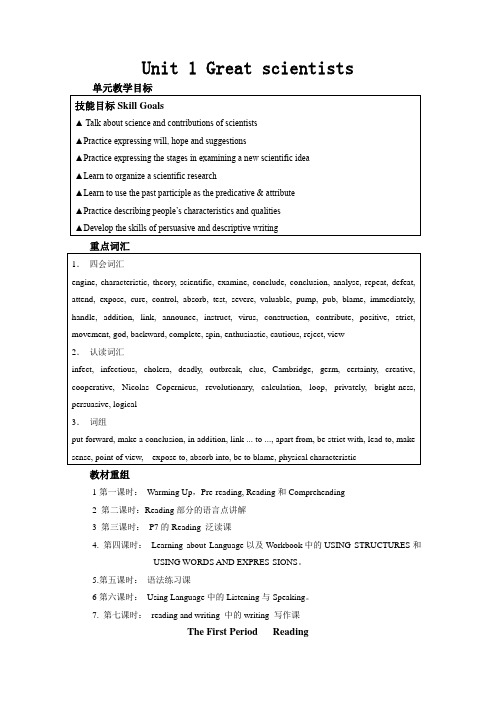
Unit 1 Great scientists教材重组1第一课时:Warming Up,Pre-reading, Reading和Comprehending2 第二课时:Reading部分的语言点讲解3 第三课时:P7的Reading 泛读课4. 第四课时:Learning about Language以及Workbook中的USING STRUCTURES和USING WORDS AND EXPRES-SIONS。
5.第五课时:语法练习课6第六课时:Using Language中的Listening与Speaking。
7. 第七课时:reading and writing 中的writing 写作课The First Period ReadingStepⅠ Lead-inAsk the students to think of some great inventions and inventors in history.T: Welcome back to school, everyone. I guess most of you have enjoyed your holiday. Maybe I should say everyone has enjoyed a scientific life. Why? Because you have enjoyed the results of the science and scientists. Now can you tell me the scientists who invented the lights, the gramophone and the computer?S1: Edison invented the lights and the gramophone.S2: The first computer was invented by a group of American scientists.StepⅡ Warming upFirst, ask some questions about great scientists. Second, tell all the students to play the game called Guess Who I Am.T: You know our life is closely related to science and scientists. We benefit a lot from them. Can you name out as many scientists as possible?T;what contributions did they make?T: Ok, you’ve known a lot about scientists and now let’s play a game called Guess Who I Am. I will show you some hints of a scientist one by one, and you guess the name of the scientist. Let’s see which group will do the best.1.I lived in ancient Greek.2.I was a mathematician.3.I discovered that objects in water were lifted up by a force that helped them float.Answer: Archimedes1.I lived in Britain.2.I published The Origin Of Species.3.I could explain how animals and plants develop as the environment changed.Answer: Charles Darwin1.I am Englishman2.I’ve worked in astronomy.3.I’ve put forward a theory about black holes.Answer;Stephen Hawking1.I was a Chinese.2.My invention had eight dragon heads round the top with eight balls in their mouths. Aroundthe bottom were eight frogs directly under a dragon’s mouth.3.My invention was the earliest instrument that told people where earthquakes happened. Answer: Zhang Heng1.I was an American.2.I invented electric light bulb3.I invented the way of giving electricity to everybody in large cities.Answer: Thomas Edison1.I was a lady and born in Poland.2.I received two Nobel prizes.3.I discovered radium.Answer : Marie CurieStep Ⅲ Pre-readingGet the students to discuss the questions on page 1 with their partners. Then ask the students to report their work. Encourage the students to express their different opinions.T: Now, class, please look at the slide. Discuss these questions with your partners. Then I’ll ask some students to report their work.Show the following on the screen:1. What do you know about infectious diseases?2. What do you know about cholera?3. Do you know how to prove a new idea in scientific research?T: Well done! When we want to solve some problems, first we should find out the problem, do some research on it, prove your findings, and then make a conclusion. This is a scientific and objective way of researching. Now let’s see how doctor John Snow did his research.Step Ⅳ ReadingT: Now lets read the title and the picture and guess what the passage may tell us.T: The effect of cholera in the nineteenth century London was devastating. Many people died without knowing the reason. It was doctor John Snow who saved the people. Please look at the screen. Let’s read the whole passage quickly and find the number below and the relevantStep Ⅴ Text analyzingAsk the students to analyze the text in groups.T: Please look at the chart on the screen. The chart shows that each paragraph of the text explains John Snow’s stages in his research. Please read the text and find out the general idea of each paragraph and match the stage with each paragraph. Discuss it in groups, and then report yourT: Now class. Can you tell me what style of the passage belongs to?T: Here are three pieces of writing. They belong to different writing styles. Now read and find out what style each piece belongs to.Making WayOnce Goethe(歌德), the great German poet,was walking in a park. He was thinking about something when he noticed he came to a very, very narrow road. Just at that time, a young man came towards him from the other end of the road. It was too narrow for both of them to pass through at the same time. They stopped and looked at each other for a while. Then the young man said rudely,“I never make way for a fool.” But Goethe smiled and said, “I always do.” Then he turned back quickly and walked towards the end of the road.Weather ReportHere’s the weather report for the next 24 hours. Beijing will be fine with the temperature from 4 to 13. Tokyo will be fine too and cloudy later in the day. The lowest temperature is l to 8. London will be rainy and windy later in the day. The highest temperature is 8 and the lowest is 4. New York will be sunny and cloudy later in the day. The temperature is 13 to 19.HeartbeatingPut your hand to the left side of your chest. Try to feel your heartbeating. The heart takes a little rest after each pump or beat. In boys or girls of your age, heart beats about 90 times a minute.A grown-up’s heart beats about 70 or 80 times a minute. But the heartbeat is different in the same person at different times. For example, the heart beats faster during exercise. It is also faster when a person is angry, scared, or excited. During sleep, the heartbeat slows down.Sample answers:S1: I think the first piece “Making A Way” is in a style of creative writing. The second piece belongs to a description style. The third piece belongs to a report style.T: Very good. Now let’s return to our text. Who can tell me the main idea of this passage?S2: I can. Clearly it tells us how John Snow defeated the disease cholera by doing scientific research.StepⅥ Language Points(见附页)StepⅧHomeworkThe Second Period Extensive ReadingStep I RevisionAsk the students to retell the text.StepⅡ Pre-readingShow the picture of the Solar System and remind them of the common knowledge of “Sun-Centered Theory”.T: Today we are going to learn more about science and scientists. There are two pictures of the great scientist and the Solar System. You can discuss with your partners about them. Then tell me sth. about them.(Mercury 水星Venus 金星Earth 地球Mars 火星Jupiter 木星 Saturn 土星Uranus 天王星Neptune 海王星Pluto 冥王星) Step Ⅲ ReadingEncourage the students to get the general ideas of the passages.T: In the last period, we have learned about how Doctor John Snow used seven stages to prove his conclusion and fulfilled his research. This period we will also deal with a scientific report. Please read the passage quickly and try to answer the questions on the screen.Show the questions on the screen.1. What’s Copernicus’ fear?2. How did Copernicus prove his theory?3. What is his theory?Sample answers:S1: I have the answer. Copernicus found his theory was against the Christian church’s saying. If he spoke out his finding, he would be punished severely.S2: Let me answer the third question. Copernicus had thought long and hard about these problems which astronomers had noticed and tried to find an answer. He used all his mathematical calculations to work on these problems. He had collected observations of the stars for over ten years. All his calculations and observations proved that his theory was right.S3: Copernicus’ theory can be expressed in this way: The sun is the center of the universe. All planets went around the sun in solar system.Step Ⅳ Further-readingThis time the students are encouraged to read the two passages carefully and then do the exercises and problems on pages 7.T: Now class. Please read the passage again. And finish EX 1 and then discuss the questions on thescreen in groups.As a scientist, one should be brave. But Copernicus was afraid of being attacked by the Christian Church. So he had hidden his theory for so many years. What do you think of this?Sample answers:Q1: 1.I think Copernicus was very coward. He should speak out his discovery and let the world know the truth earlier.2.I don’t agree with you. He was more cautious than coward. If he had published his ideas, he would have been killed just as Bruno who was burnt to death because his theory was against the Christian Church’s.T: I quite agree with you. And I am glad you have known so much about the science.StepⅤ Language Points(见附页)And then write the following sentences on the blackboard; ask the students to pay attention to the past participle. Guide them to find out their functions in the sentences.Show the following on the screen.1. Nicolas Copernicus was frightened and his mind was confused.2. He placed a fixed sun at the center of the solar system ...3. He joined these points together using curved lines ...T: Please read the three sentences and tell me what parts of speech the past participles are acting as.Step Ⅵ Homework1. Search on the Internet for more information about Copernicus and Euler.2. Prepare for the language study, reviewing the words and expressions in this unit.The Third Period Language StudyStepⅠRevision and Lead-inTask 1: Ask the students to turn to pages 4 and 42 and do Exercise 1. And then check the answers.Task 2: Ask the students to read and understand the explanations in Exercise 2 on page 4.T: Very good! Can you put the verb “make” with a noun to form a “predicate + object” phrase? For example: “making a mistake” instead of “to mistake”.Sample answers:S: “make an agreement”, “make an admission”, “make an apology”.T: Well done! Please find and collect as many examples as you can as homework. Next period I’ll check your work.Task 4: Ask the students to do Exercises 3 on page 43 and then check the answers.Step Ⅱ PracticeTask 1: Enable the students to do the following exercises.T: Please look at the screen and put them into English using “make + n” and past participles. Show the following on the screen:约会,闲言碎语,道歉,竞争,选择,不速之客,感到沮丧的学生,受到鼓舞的竞赛者,拥挤的街道Sample answers:make an appointment, make gossip, make an apology, make a contest, make a choice, unexpected visitors, discouraged students, inspired contestant, crowded streetsStep Ⅲ GrammarExplain the usage of the past participles as predicative and attribute.1. 过去分词作表语表示主语所处的状态。
高中英语必修五第一单元教案
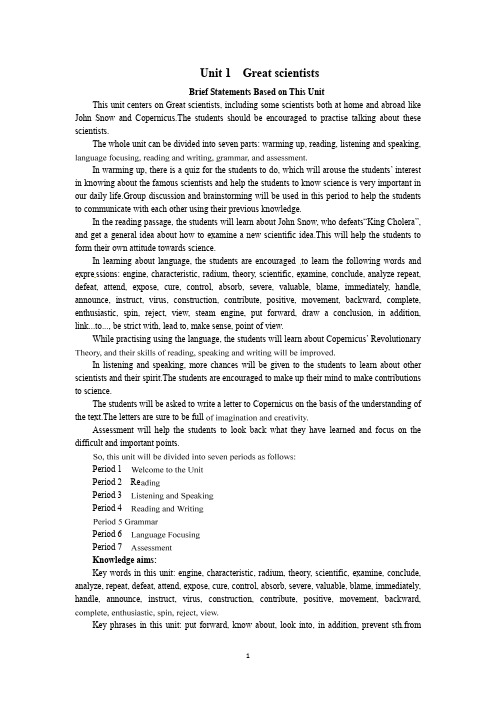
Unit 1Great scientistsBrief Statements Based on This UnitThis unit centers on Great scientists, including some scientists both at home and abroad like John Snow and Copernicus.The students should be encouraged to practise talking about these scientists.The whole unit can be divided into seven parts: warming up, reading, listening and speaking,In warming up, there is a quiz for the students to do, which will arouse the students’ interest in knowing about the famous scientists and help the students to know science is very important in our daily life.Group discussion and brainstorming will be used in this period to help the students to communicate with each other using their previous knowledge.In the reading passage, the students will learn about John Snow, who defeats“King Cholera”, and get a general idea about how to examine a new scientific idea.This will help the students to form their own attitude towards science.In learning about language, the students are encouraged to learn the following words and expre ssions: engine, characteristic, radium, theory, scientific, examine, conclude, analyze repeat, defeat, attend, expose, cure, control, absorb, severe, valuable, blame, immediately, handle, announce, instruct, virus, construction, contribute, positive, movement, backward, complete, enthusiastic, spin, reject, view, steam engine, put forward, draw a conclusion, in addition, link...to..., be strict with, lead to, make sense, point of view.While practising using the language, the students will learn about Copernicus’ RevolutionaryIn listening and speaking, more chances will be given to the students to learn about other scientists and their spirit.The students are encouraged to make up their mind to make contributions to science.The students will be asked to write a letter to Copernicus on the basis of the understanding of the text.The letters are sure to be fullAssessment will help the students to look back what they have learned and focus on the difficult and important points.Period 1Period 2RePeriod 3Period 4Period 6Period 7Knowledge aims:Key words in this unit: engine, characteristic, radium, theory, scientific, examine, conclude, analyze, repeat, defeat, attend, expose, cure, control, absorb, severe, valuable, blame, immediately, handle, announce, instruct, virus, construction, contribute, positive, movement, backward,Key phrases in this unit: put forward, know about, look into, in addition, prevent sth.fromdoing, lead to, make sense, punish sb.for, suggest doing sth.steam engine, draw a conclusion, link...to..., be strict with, lead to, point of view.Key sentence patterns:1 But he became inspired when he thought about helping ordinary people exposed to cholera.3 Only if you put the sun there did the movements of the other planets in the sky make sense.Grammar in this unit:Ability aims:4.To learnEmotion aims:and how science helps to improve our society and change our life.Meanwhile, inspire th e students to learn from the scientists and form their positive attitude towards science.Period 1Welcome to the UnitThe General Idea of This PeriodThe unit centers on“great scientists”.This is the first period of this unit.During this period, the students should be encouraged to give their previous knowledge of some of the famous scientists, participate in the activities in class and try to get more information from the discussion.They will take part in different forms of activities, including pair work, group work, competition, andWords and expressions in this unit will help the students to talk about the topic“great scientists”.So at the beginning of this period, the teacher should spend some time training the students to read them and help the students pronounce them correctly.The students are encouraged to learn the new words in groups by themselves, using dictionaries and other reference books.Then more time should be given to the students to get familiar with the words and stly, several sentences will be given to the students to help them to know how to use some of the phrases.This unit is about“great scientists”, so from the very beginning, the teacher can udents talk about their dreams in the future.Then the teacher can let the students brainstorm something about great scientists.The students are free to say anything that they know.The students will be quite interested in this topic.This activity gives the students a chance to express their feelings about their favorite scientist.At the same time, this activity can stir the students’ enthusiasm in science.Then the teacher can have the students match the famous scientists with their discoveries, inventions or theories, making sure that they have some common sense about some world-famous scientists.and let other students guess who he or she is talking about.In this way, the students should learn toAfter that, the students will feel comfortable to do the quiz in the text.The students should beencouraged to give more information about these ten scientistMeanwhile, the students’ interest in scientists and science should be cultivated.So two topicThe post-class activities are designed to arouse the students’ interest in science and encourage them to“DIY—do it yourself” in their daily life if they have some doubt in some areas.Teaching Important PointsHave the students discuss great scientists.Understand and learn the following words and expressions: engine, characteristic, radium, theory, scientific, examine, conclude, analyse, repeat, defeat, attend, expose, cure, control, absorb, severe, valuable, b lame, immediately, handle, announce, instruct, virus, construction, contribute, positive, movement, backward, complete, enthusiastic, spin, reject, view, steam engine, put forward, draw a conclusion, in addition, link...to..., be strict with, lead to, make sense, point ofTeaching DifficultiesWhat can we leaTeaching AidsCAI equipment with a Multi-Three Dimensional Teaching AimsKnowledge AimsLearn someKnow about the outstanding discoveries, inventions and theories from some well-known scientists.Ability AimsDevelop the students’ abilityEmotional AimsHelp the students to form the good habit in learning and encourage the students to take part inHelp the students to realize that it is scientific spirit that makes those scientists successful.Teaching ProcedureStep 1 GreetingTeacher: HellStep 2 Lead inT: I’m very glad to see you all here.After a long holiday, all of you look energetic and happy.I hope that we will work hard together happily all through the year.I do believe that a bright future i s waiting for you.We are sure to realize our dreams in the near future.By the way, I’d like to know what you would like to be in the future.Let me share your dreams.Anyone who gives your idea will get a star for your group.Ready?Go!S: I admire Yang Liwei very much, who is a great honour to our motherland.I’d like to be an astronaut like him.T: Yeah, the spacecraft, Shenzhou V, orbited the earth 14 times in 21 hours, making China the third country to have successfully sent an astronaut into space.I hope you will realize your dream.S: I want to be a doctor.I hope I’ll be an outstanding one and be expert in finding cures forT: That’s a good idea.There are so many patients with cancers in the world, who are suffering a lot.ThankS: I want to be an English teacher like you.For one thing, I like English very much; for another, you are not only strict with us but also patient with us.You are just our friends and maybeT: I’m really glad to hear that.It’s my great honor to be your friends and I like my job very much.S: I’d like to be an expert in environment.You see, with the development of industry, our globe is seriously polluted.Dirty water, polluted air, and loud noise make our living conditionsT: Yes, someone predicted that the last drop of water in t he world would be the tear of human being’s.I think all of us should pay attention to our environment, and make our con tributions toS: I’m so interested in physics.And I have read Stephen Hawking’s A Brief History ofwill go hand in hand with the development of science.T: Yeah, I can’t agree with you more.Science plays an important part in the development of our society.There are so many examples in the history of human beings.Ss: ...T: I’m so glad to share your dreams.Your ambition and careful t houghts really leave a good and amazing impression on me.I like them.In this unit, you will learn something about“Great scientists”.Maybe you will know what you need in your efforts to realize your dreams after we talk about some world-famous scientists.Be fore we come to“Warming up”, I’d like you to come toStep 3 Word puzzles(Let the students read the words and expressions together.Help them pronounce the new words and expressions ter give them some time to practise reading and rememberT: Here are some definitions of some of the words from this unit.Please work in pairs andWords Definitions or explanationsA.examineB.repeatC.theoryD.immediatelypleteF.valuableG.announceH.control e or bringI.positiveJ.conclude 10.quite certain or sureT: Now, let’s check the answers.A—4, B—2, C—1, D—3, E—6, F—5, G—7, H—9, I—10, J—8. You have done a good job.I will give you some more minutes to go over all the words and1.“All roads lead to2.This sentence doesn’t make any sense3.Our English teacher is not only strict with4.He is good-looking, apart from5.It is announced that the spacecraft, Shenzhou Ⅵ6.It is not Tom but you who are to blame7.In 1995, the Chinese government put forward a plan for“rejuvenating the nation by relying8.Have you drawn any conclusion after you read this passage?T: Well done.So much for the learning of the new words and expressionsStep 4 BrainstormingT: Now let’s come to the title of this unit Great scientists.When we talk about greatS1: Madame Curie, who got two Nobel Prizes, one for physics and the other for chemistry, isS2sayings“Genius is one percent inspiration and ninety-nine percent perspiratio n.”S3: Yes, we lead a better life now with the help of science.Without Edison, maybe now we areS4: I also think of one of the quotes from Albert Einstein, “Imagination i s more important than knowledge.”S5: All the scientists are devoted to the career that they choose, and they set good examples toS6: Take all the scientists for example, if we want to be successful in the future, we should not only learn something from our textbooks, but also take part in social practice and get close toS7: I like plants very much.I just think of the two key scientists in the field of botany, Carl Linnaeus and Joseph Banks.The former one laid the foundation for the classification of plants, while the latter one also made great contributions to the development and direction of botany.Ss: ...T: I’m glad to see that you have a great deal of previous knowledge of famous scientists in the world.Step 5 Previous knowledgeT: Now let’s match some of the great scientists with their famous discoveries, inventions orFamous scientists Discoveries/InvA.Isaac Newton 1.Evolution (进化论B.Charles Darwin 2.Discovery of Radium(镭)C.Madame CurieD.Albert EinsteinE.Thomas Alva EdisonF.Nicolaus CopernicusG.Stephen HawkingH.Zhang Heng(Check the answers with all the students: A—3, B—1, C—2, D—5, E—4, F—8, G—7, H—6.)T: Since you have a better understanding of some of the great scientists, let’s play a game. Please work in groups and describe one of the great scientists, and then let other students guessGroup 1: In the eighteenth century, there lived a great scientist who conducted a number of experiments in which he showed what electricity is.Once he did a famous kite experiment on aS: Benjamin Franklin.Group 2: It is said that this English gentleman was sitting in his garden one day when suddenly he was hit by a falling apple.The story is probably not true, but this man did mention that he got one of his best-known ideas while watching apples fall from a tree.His name makes youd hedrew up a system of how objects move.His laws for motion are still used in physics today, at leastGroup 3:Food is what sets this great mind on fire.Rice, to be exact.This great mind has spent most of his life looking for ways to help farmers grow more rice so that all of us will have enough food to eat.He is known as the father of modern rice, but because of his long friendship with all the farmers in China, he would ratGroup 4: He was born on 8 January 1942 in Oxford, England.He has worked on the basic laws which govern the universe.He showed that Einstein’s General Theory of Rel ativity implied space and time would have a beginning in the Big Bang and an end in black holes.He has three popular books published: his best seller A Brief History of Time, Black Holes and Baby UniversesSs: ...Step 6 QuizT: You have already known some information about some of the great scientists.Now let’s doQuiz Questions1.Which scientist discovered that objects in water are lifted up by a force that helps them float?2.Who wrote a book explaining how animal s and plants developed as the environment changed?4.Who used peas to show how physical characteristics are passed form parents to their9.Check the answ1.Archimedes2.Charles Darwin3.James Watt7.Leonardo davinciHawkingT: Please work in groups and have a discussion to find as much information as possible about(The teacher had better join in the discussion and give them some guidance whenever necessary.After the discussion, ask some students to give a short report about what the group haveStep 7 PracticeT: Today we have learned a lot about great scientists in the world.We can learn from them to live our dreams.And we teachers are too willing to help you.In your opinion, what should ourS: Our school should give the students more chances to take part in social practiceS: Our teachers should help the students use their imaginationsS: We students should solve the problems on our own.(Ask more students to give their opinions.The teacher should encourage them, join them,Step 8 Discussion (Group Competition)T: Your ideas are so wonderful and amazing.I admire them very much.Now let’s come to our topic.Topic 2: What q(Give the students several minutes to have a discussion.Then let them have a group competition.)Step 9 Summing upT: In this period, we have talked a lot about great scientists.You have a lot of previous knowledge and you are full of imagination and creativity.Those scientists set good examples to us.And I think all of us are happy about learning more of them.After class, it’s better to read some books about them and you can surf the Internet to get more i nformation.And I’d like you to makeThe Design of the Writing on the BlackboardU nit 1Great scientistsPeriod 1Welcome to the UnitBrainstormingResearch and ActivitiesDIY1.Cover a glass of water with a piece of thick paper.Put one hand on the paper and turn the2.Fill one glass with fresh water and another glass with salt water. Put an ice cube in each glass.What happens?Why?3.Find out as many famous sayings from those scientists as possible.Reference for Teaching1.Charles Darwin was born in Shrewsbury(shropshire) to a moderately wealthy family with a strong intellectual heritage.His grandfather, Erasmus Darwin, was a physician, poet and biologist who laid some of the groundwork for the grandson’s revolutionary ideas.Charles attended Christ’s College at Cambridge with initial thoughts of entering the clergy, but soon took up studies in biology, zoology and geology.From 1831 to 1836, he served as a naturalist aboard the HMS Beagle on its scientific mission to South America and the Pacific.Back in England, he published a series of scientific treatises which established his reputation as one of the prominent thinkers of his day.From 1842 onwards, he lived on a country estate in Kent and pursued his studies among itsBy 1844, he had written the initial draft of his groundbreaking treatise on evolution and natural selection.However, he left this work unpublished for several years, preferring to refine and elaborate its core ideas.In 1858, he read a forthcoming paper by a fellow scientist Alfred Russell Wallace whose thesis closely paralleled Darwin’s own unpublished ideas, an event which pushed Darwin to go public with h is own research.Both Wallace’s and Darwin’s papers were presented to the Linnean Society in a famous July, 1858 meeting. Darwin published The Origin of Species by Means of Natural Selection in 1859, sparking decades of contentious debate which ultimately led to the universal scientific recognition of Darwin’s thesis.In later years, he developed his ideas further in monographs on different types of plant and animal life.Notes:Shrewsbury: 什鲁斯伯里[英国英格兰西部城市physician: 内科医生(注意区分physicist, 物理学家revolutionary: 创新的HMS: (英国)皇家海军舰船treatises: 论文2.Stephen William Hawking was born on 8 January 1942 (300 years after the death of Galileo) in Oxford, England.His parents’ house was in north London, but during the Second World WarOxford was considered a safer place to have babies.When he was eight, his family moved to St Albans, a town about 20 miles north of London.At eleven Stephen went to St Albans School, and then on to University College, Oxford, his father’s old college. Stephen wa nted to do Mathematics, although his father would have preferred medicine.Mathematics was not available at University College, so he did Physics instead.After three years and not very much work he was awarded a first class honours degree in Natural Science.Stephen then went on to Cambridge to do research in Cosmology, there being no-one working in that area in Oxford at the time.His supervisor was Denis Sciama, although he had hoped to get Fred Hoyle who was working in Cambridge.After gaining his Ph.D.he became first a Research Fellow, and later on a Professorial Fellow at Gonville and Caius College.After leaving the Institute of Astronomy in 1973 Stephen came to the Department of Applied Mathematics and Theoretical Physics, and since 1979 has held the post of Lucasian Professor of Mathematics.The chair was founded in 1663 with money left in the will of the Reverend Henry Lucas, who had been the Member of Parliament for the University.It was first held by Isaac Barrow, and then in 1663 by Isaac Newton.Stephen Hawking has worked on the basic laws which govern the universe.With Roger Penrose he showed that Einstein’s General Theory of Relativity implied space and time would have a beginning in the Big Bang and an end in black holes.These results indicated it was necessary to unify General Relativity with Quantum Theory, the other great Scientific development of the first half of the 20th Century.One consequence of such a unification that he discovered was that black holes should not be completely black, but should emit radiation and eventually evaporate and disappear.Another conjecture is that the universe has no edge or boundary in imaginary time.This would imply that the way the universe began was completelyHis many publications include The Large Scale Structure of Spacetime with G F R Ellis, General Relativity: An Einstein Centenary Survey, with W Israel, and 300 Years of Gravity, with W Israel.Stephen Hawking has two popular books published: his best seller A Brief History ofProfessor Hawking has twelve honorary degrees, was awarded the CBE in 1982, and was made a Companion of Honour in 1989.He is the recipient of many awards, medals and prizes andStephen Hawking continues to combine family life (he has three children and one grandchild), and his research into theoretical physics together with an extensive programme of travel and public lectures.3.Humphry Davy, a woodcarver’s son, was born in Penzance in 1778. After being educated in Truro, Davy was apprenticed to a Penzance surgeon.In 1797 he took up chemistry and was taken on by Thomas Beddoes, as an assistant at his Medical Pneumatic Institution in Bristol.Here he experimented with various new gases and discovered the anesthetic effect of laughing gas (nitrous oxide).Davy published details of his research in his book Researches, Chemical and Philosophical (1799).This led to Davy being appointed as a lecturer at the Royal Institution.He was a talentedIn 1806 Davy published On Some Chemical Agencies of Electricity. The following year he discovered that the alkalis and alkaline earths are compound substances formed by oxygen unitedwith metallic bases.He also used electrolysis to discover new metals such as potassium, sodium,Davy was now considered to be Britain’s lead ing scientist and in 1812 was knighted by Georg e Ⅲ.With his assistant, Michael Faraday, Davy travelled abroad investigating his theory ofIn 1815 Humphry Davy invented a safety lamp for use in gassy coalmines, allowing deep coal seams to be mined despite the presence of firedamp (methane).This led to some controversy as George Stephenson, working in a colliery near Newcastle, also produced a safety lamp thatOne o f Davy’s most important contributions to history was that he encourage manufacturers to take a scientific approach to production.His discoveries in chemistry helped to improve several industries including agriculture, mining and tanning.Sir Humphry Davy died in 1829.4.Leonardo da Vinci(b.1452, Vinci, Republic of Florence [now in Italy]—d.May 2, 1519, Cloux, Fr.), Italian painter, draftsman, sculptor, architect, and engineer whose genius, perhaps more than that of any other figure, epitomized the Renaissance humanist ideal.His Last Suppe (1495-1497) and Mona Lisa (1503-1506) are among the most widely popular and influential paintings of the Renaissance.His notebooks reveal a spirit of scientific inquiry and a mechanical inventiveness that were centuries ahea5.Madam Curie is a French professor of physics.She was born in Poland in 1867.In 1891 she went to study in Paris University because at that time women were not admitted to universities in Poland.When she was studying in Paris, she lived a poor life, but she worked very hard.In 1895 she married Pierre Curie, and then they worked together on the research into radioactive matter.They discovered two kinds of radioactive matter—polonium and radium.In 1904 she and her husband were given the Nobel Prize for physics.In 1906 Pierre died, but Marie went on working.She received a second Nobel Prize for Chemistry in 1911.So she became the first scientist in the world to win two Nobel Prizes.6.James Watt: British engineer and inventor who made fundamental improvements in the steam engine, resulting in the modern, high-7.Gregor Mendel was an Austrian botanist and founder of the science of genetics.Through years of experiments with plants, chiefly garden peas, he discovered the principle of the8.Archimedes: Greek mathematician, engineer, and physicist.Among the most important intellectual figures of antiquity, he discovered formulas for the area and volume of various geometric figures, applied geometry to hydrostatics and mechanics, devised numerous ingenious mechanisms, such as the Archimedean screw, and discovered the principle of buoyancy.9.Michael Faraday (September 22, 1791—August 25, 1867) was a British scientist(a physicist and chemist) who contributed significantly to the fields of electromagnetism and electrochemistry. He also invented the earliest form of the device that was to become the Bunsen burner, which is used almost unMichael Faraday was one of the great scientists in history.Some historians of science refer to him as the greatest experimentalist in the history of science.It was largely due to his efforts that electricity became a viable technology.The SI unit of capacitance, the farad(symbol F) is named after him.。
高中英语说课教案必修5Unit1
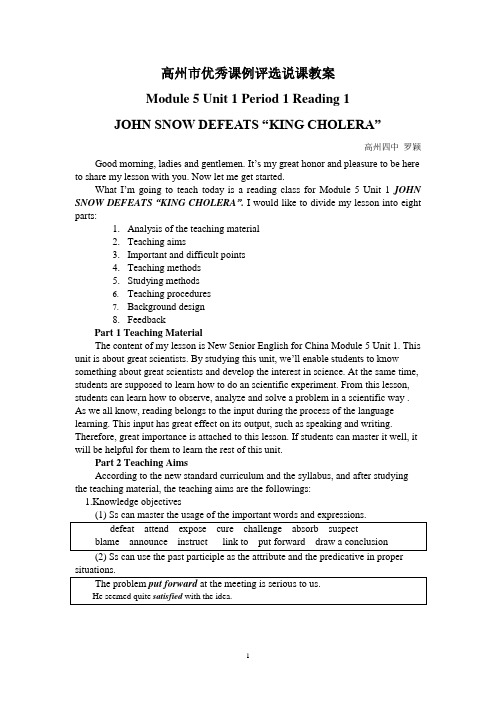
高州市优秀课例评选说课教案Module 5 Unit 1 Period 1 Reading 1JOHN SNOW DEFEATS “KING CHOLERA”高州四中罗颖Good morning, ladies and gentlemen. It’s my great honor and pleasure to be here to share my lesson with you. Now let me get started.What I’m going to teach today is a reading class for Module 5 Unit 1JOHN SNOW DEFEATS “KING CHOLERA”. I would like to divide my lesson into eight parts:1.Analysis of the teaching material2.Teaching aims3.Important and difficult points4.Teaching methods5.Studying methods6.Teaching procedures7.Background design8.FeedbackPart 1 Teaching MaterialThe content of my lesson is New Senior English for China Module 5 Unit 1. This unit is about great scientists. By studying this unit, we’ll enable students to know something about great scientists and develop the interest in science. At the same time, students are supposed to learn how to do an scientific experiment. From this lesson, students can learn how to observe, analyze and solve a problem in a scientific way . As we all know, reading belongs to the input during the process of the language learning. This input has great effect on its output, such as speaking and writing. Therefore, great importance is attached to this lesson. If students can master it well, it will be helpful for them to learn the rest of this unit.Part 2 Teaching AimsAccording to the new standard curriculum and the syllabus, and after studying the teaching material, the teaching aims are the followings:1.Knowledge objectives(3) Ss can understand the content of the lesson, talk about finding some problems,analyzing the problems and know how to deal with them. In this way, Ss can get their own ideas about how to make a scientific experiment.2.Ability objectives(1) To develop Ss’ abilities of reading , speaking and writing(2) To guide Ss to set up effective studying strategies.(3) To improve the student’s reading ability, especially their s kimming andscanning ability.(4) To train Ss’ abilities to self-study and to study through cooperation.3.Strategy objectives(1)Searching for information(2)Discovering by themselves(3)Persuasive communication(4)Harmonious co-operation4.Emotional or moral objectives(1)By completing the tasks, Ss increase their interest in science and set upself-confidence in solving problems independently and in a scientific way.(2)Teach Ss to appreciate and admire great people and build up their mentalpower.5.Cultural awareness objectivesLet Ss know that it’s really something that doctors in China have defeated so many diseases and protected us Chinese people from Bird Flu, SARS and so on.In this lesson they will be inspired to learn how to fight against deadly diseases and to arouse their interest in medicine.Part 3 Important and Difficult PointsThe important points of this lesson are how to find useful information by skimming and scanning in the process of reading. Then we should focus on how to teach Ss to be people of good qualities, and there exists great chance for them to be great people in the future.The difficult points are how to organize Ss to talk about their experience of how to find a problem, analyze it and solve it, especially using complex sentences like “I felt annoyed because the schedule put forward by the other party was really inconvenient for me ” . In this sentence, annoyed and put forward are the past participles used as the predicative and the attribute respectively.Part 4 Teaching MethodsAs is known to us all, a good teaching method requires that the teacher should help Ss develop good sense of the English language. For achieving these teaching aims, I will use the following methods according to the new standard curriculum and the syllabus.Communicative Approach(交际教学法)Whole Language Teaching(整体语言教学法)Task-based Language Teaching (任务教学法)Total Situational Action (情景教学法) a “scene —activity” teaching method . It establishes a real scene in which the teacher and the Ss interact with each other in a much more realistic way.CAI (电脑辅助教学) can provide a real situation with its sound and picture.Part 5 Learning methodsThe whole lesson is student-centred. Ss can communicate with each other on comprehending the reading passage JOHN SNOW DEFEATS “KING CHOLERA . What I mean is that they understand the passage as a whole process of making a scientific experiment. This process provides a real scene in which relevant words and phrases are tied together. In this way, they can learn words and phrases as if in the real life. Then Ss are given tasks to find out how the procedures of making a scientific experiment are presented in the reading passage. After they have got a hang of making scientific experiments, they are supposed to solve a real problem happening in their daily life with what they have learned. During the whole lesson, Ss will complete their tasks through individual work, pair-work and group-work which will be designed according to specific situations.Part 6 Teaching ProceduresStep 1. Lead-in. ( 5 mins)Organize Ss to talk about great scientists.Teaching method: Communicative Approach(交际教学法)Task-based Language Teaching (任务教学法)Total Situational Action (情景教学法)CAI (电脑辅助教学)Learning method: pair-work; discussionPurpose of my design:(1) Be aware of the advantages and convenience the scientific inventions have brought to us.(2) To arouse Ss’ attention to great scientists and to how to be a great person.(3) To set up suspense and develop interest in reading the following passage.Step 2. Pre-reading ( 5 mins)Do you know how to prove a new idea in scientific research? Put the following stages into the correct order.Teaching method: Communicative Approach(交际教学法)Task-based Language Teaching (任务教学法)Total Situational Action (情景教学法)CAI (电脑辅助教学)Learning method: group-work; discussionPurpose of my design:(1) To get Ss know the right procedures of making a scientific research(2) To get Ss work with sharing and cooperationStep 3. While-readingTask 1. Skimming( 5 mins)Read the passage and number these events in the order that they happened.Teaching method: Task-based Language Teaching (任务教学法)CAI (电脑辅助教学)Learning method: individual workPurpose of my design:(1) To let Ss get an overall idea of what happened in the story(2) To get Ss know the procedures of making a scientific research from the beginning to the endTask 2. Scanning ( 10 mins)Read the passage carefully, find out which stage each paragraph demonstrates and what the examples are.Teaching method: Task-based Language Teaching (任务教学法)Total Situational Action (情景教学法)CAI (电脑辅助教学)Learning method: individual workPurpose of my design:(1) To let Ss get a perfect comprehension of the reading passage(2) To let Ss experience the whole process of making a scientific research by reading the passage. Then they will have the ability to make a research on their own. Task 3. Consolidation ( 8 mins)Complete the following passage without referring to the textbook, using the words and phrases from the reading passage.John Snow was a 1 doctor in London. There was the most deadly 2 Called “King Cholera” of its day. Every time there was a(n) 3 , many people died. John Snow wanted to face the 4 and 5 the problem. He knew that it would never be 6 until its cause was found. At that time, there were two theories about cholera. The first suggested that cholera 7in the air. The second suggest that people 8 this disease into their bodies with their 9 . John Snow 10 the second theory was correct but he needed evidence. So he 11 data to test the two theories. He 12 on a map where all the dead people had lived and the map gave a valuable 13 about the cause of the disease. It seemed that the water was to 14 . Next, John Snow looked into the 15 of the water for these streets. He found two other deaths in another part of London that were 16 to the Broad Street outbreak. With enough evidence, he announced with 17 that 18 water carried the virus of cholera. Thus King Cholera was defeated.Keys:1.famous2.disease3.outbreak4.challenge5.solve6.controlled7.multiplied8.absorbed9.meals10.suspected11.collected12.marked13.clue14.blame15.source16.linked17.certainty18.pollutedTeaching method: Whole Language Teaching(整体语言教学法)Task-based Language Teaching (任务教学法)Total Situational Action (情景教学法)CAI (电脑辅助教学)Learning method: individual work and group-workPurpose of my design:(1) To organize Ss to practice the important words and phrases they have learned in a relatively real scene(2) To strengthen students’ ability to grasp the whole situation while reading(3) To let Ss experience the whole process of making a scientific research by summarizing the passage. Then they will have the ability to make a research on their own. Finally they can use those words and phrases they have just learned to talk about the whole process of making an research on solving a problem.Step 4. Post-reading( 12 mins)Read the following passage and design a plan to make a research on how to fight against bird flu.Bird FluAvian influenza —known informally as avian flu or bird flu —refers to "influenza caused by viruses adapted to birds." Strains of influenza viruses are adapted to multiple species, though may be preferential towards a particular host. For example, viruses responsible for influenza pandemics are adapted to both humans and birds. Since the first H5N1 outbreak occurred in 1987, it has killed millions of poultry in a growing number of countries throughout Asia, Europe, and Africa. There has been an increasing number of H5N1 bird-to-human transmissions, leading to clinically severe and fatal human infections. While it had been spreading throughout Asia since 2003, avian influenza reached Europe in 2005, and the Middle East, as well as Africa, in the following year. This caused Robert G. Webster, a leading expert on avian flu, to publish an article titled "The world is teetering on the edge of a pandemic that could kill a large fraction of the human population" in American Scientist. Since the article was written, the world community has spent billions of dollars fighting this threat with limited success. Influenza virus subtype H7N9 is a novel avian influenza virus first reported to have infected humans in 2013 in China. It has been established that many of the human cases of H7N9 appear to have a link to live bird markets. No human cases or animal infections have been detected on poultry farms or in the wild bird population. So far, there do not seem to be any cases of human-to-human transmission. Disease-control centers around the world are making avian flu a top priority. These organizations encourage poultry-related operations to develop a preemptive plan to prevent the spread of bird flu and its potentially pandemic strains. Infected birds were culled and slaughtered. The public lost confidence with the poultry products, thus decreasing the consumption of chicken products. In the aware of bird flu pandemic, people should have careful thought to adopt suitable Infection Control Procedures. To try to avoid flu infection, protecting eyes, nose, mouth and hands from virus particles will be a major priority. Avoiding contact with poultry and maintaining good personal hygiene is very important, too.Teaching method: Whole Language Teaching(整体语言教学法)Task-based Language Teaching (任务教学法)Total Situational Action (情景教学法)CAI (电脑辅助教学)Learning method: individual workPurpose of my design:(1) To organize Ss to practice the important words and phrases they have learned in a relatively real scene(2) To teach Ss how to make a scientific research(3) To strengthen students’ ability to think of a problem independentlyStep 5. HomeworkWrite a composition with the title : How I Fight Against Bird Flu. They are supposed to finish the composition referring to the following table.Teaching method: Whole Language Teaching(整体语言教学法)Task-based Language Teaching (任务教学法)Total Situational Action (情景教学法)CAI (电脑辅助教学)Learning method: individual work, group-work and pair-workPurpose of my design:(1) To organize Ss to practice the important words and phrases they have learned in a relatively real scene.(2) To consolidate what they have learned in this lesson.(3) To strengthen students’ ability to think independently and work cooperatively.11Part 7 Background DesignTitle : JOHN SNOW DEFEATS “KING CHOLERA ”Part 8 FeedbackToday we have learned Module 5 Unit 1 JOHN SNOW DEFEATS “KING CHOLERA ”. Inthis lesson, you have talked about some great scientists and their contributions. Are you inspired by them to be dedicated to scientific research and improve the well-being of mankind? Going after John Snow, we know the procedures of doing a scientific research. Thus you are supposed to do a scientific research just like him, on the topic of bird flu. I hope you can adjust your learning strategies while reading the passage and finishing those tasks. Independence and cooperation are both welcome when necessary. Enjoy your time!。
- 1、下载文档前请自行甄别文档内容的完整性,平台不提供额外的编辑、内容补充、找答案等附加服务。
- 2、"仅部分预览"的文档,不可在线预览部分如存在完整性等问题,可反馈申请退款(可完整预览的文档不适用该条件!)。
- 3、如文档侵犯您的权益,请联系客服反馈,我们会尽快为您处理(人工客服工作时间:9:00-18:30)。
Unit11.put forwardYou ought to put your watch forward ten minutes.We all put him forward for the position of club secretary.No one has put forward a better plan than the one under consideration.翻译句子:①你为什么不把椅子往前挪一点, 以便看得更清楚些?Why don't you put your chair forward to get a better view?②我们得把会议提前。
We shall have to put the meeting forward.③他提出一项计划交由全体委员审议。
He put forward a plan for the committee to consider.相关短语:2.conclude v.The meeting concluded after three hours.He concluded his speech with some amusing remarks.What can you conclude from these facts?conclusion n.They drew the conclusion that the boy would perform very well in the coming week.In conclusion, I’d like to say I enjoyed my staying here.We have come to the conclusion that the company has been making great progress these months.翻译句子:①让我用一句谚语来结束我的演讲:条条大路通罗马。
Let me conclude my speech with a saying: all roads lead to Rome.②我得出的结论是她忘记了我的生日。
I draw the conclusion that she forgot my birthday. 3. defeat vt. n.He defeated his competitors with difficulty at the school sports meet.We didn’t consider the possibility of defeat.win, beat, defeat翻译句子:①昨天在下国际象棋时他击败了我。
He defeated me at chess yesterday.②你还记得那两次失败吗?Do you still remember the two defeats?3.They are so carefully that they hardly make any mistakes.→So carefully_________________________________.He performed so well that the audience cheered for him.________________________________________________4.attend vt.Jane has attended his sick father for years.The manager failed to attend the important meeting because he was on business.翻译:他决定和朋友一起参加这次聚会。
He decided to attend the meeting with his friends.5.expose vt.He always exposes his skin to the sun.We want to expose the kids to as much art as possible.The more one is exposed to the English-speaking environment, the better he or she will learn the language.翻译:去国外旅游会使孩子们接触到不同的语言和文化。
Travel abroad will expose children to different languages and cultures.6.Neither he nor I am going to attend the meating.连接词或短语作主语时,谓语动词应与nor 后的部分一致。
类似结构:not only…but also.., either…or…,not…but…7.every timeEvery time we are in trouble, David comes to help us in time.The last time we saw him, he was working in a shoe shop.Each time, the last/first time, next time, the moment每当我看见他都会想起我叔叔。
Every time I see him, I always think of my uncle.8.challenge n. vt. challenging adj.To deal with so many children is a real challenge.Mr. Wang challenged me to play tennis.翻译:这个女孩的新职位挑战她在空余时间更用功的学习。
The girl’s new position challenges her to study harder in her spare time.短语:give a challenge accept/take a challengeface the challenge meet the challenge8.cure n. vtThe doctors are trying to find a cure for that strange disease.I’m sure the girl’s wound will be cured.The medicine will cure him of his cough.9. suggest vt①I suggested to him that we should deal with the problem in another way. He suggested taking the children to the zoo.②The expression on his face suggested that he was satisfied with the result.9.absorb vt.The kind of paper absorb ink.The book absorbed his attention.When I saw him, he was absorbed in his book. 翻译:这个聪明的男孩吸收了老师能够传授给他的所有知识The clever boy absorbed all the knowledge his teacher could give him她太专注于自己的工作了,以致没有听到有人敲门。
She was so absorbed in her job that she didn’t hear anybody knocking at the door.10. suspect vt. n.I suspect him to have stolen the money.The policeman suspected the thief of lying.One boy was killed and his roommate became the suspect.翻译:他醒来的时候发现表没有了。
他似乎怀疑是我偷了表。
When he woke up, he found his watch gone. He seemed to suspect me of stealing it.11. blame vt. n.You are not to blame. I can’t put the blame on you.Marry blamed the failure of their marriage on Jack.翻译:是他而不是你,应该受到责备。
It is him not you that is to blame.把责任归咎于李明是不对的It’s wrong to put the blame on Li Ming.12. pollute vt. pollution n.Polluting pollutedMany young people can not resist the spiritual pollution.13.announce vt. announcement announcerThe bell announced the end of the class.The news was announced to the public.It was announced that a cold wave would come soon.翻译:这个消息已经通告给公众。
The news was announced to the public.他告诉我们他马上要退休了。
He announced to us that he would retire soon.make an announcement14.immediately adv. Conj.instantly directlyIf you hear an alarm, leave the building immediately.The women athlete began to cry immediately the result was announced.15.make sensemake sense of make no senseWhat he said makes no sense.Can you make sense of what the teacher is saying?There is no sense in calling off the meeting.翻译:你所说的和你所做的对我来说没有任何意义。
